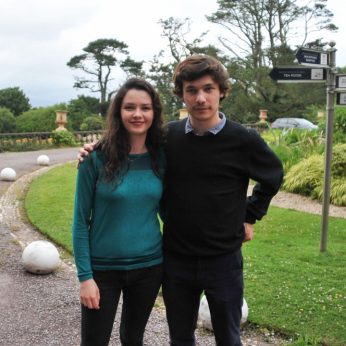Composer: Grazyna Bacewicz (b. 1909 - d. 1969)
Performance date: 23/06/2023
Venue: Bantry House
Composition Year: 1945
Duration: 00:10:18
Recording Engineer: Tom Norton, RTÉ
Instrumentation: vn, pf
Instrumentation Category:Duo
Artists:
Mairead Hickey -
[violin]
Jérémie Moreau -
[piano]

Violin Sonata No.1 – Sonata da Camera [1945]
1. Largo
2. Allegro
3. Tempo di minuetto
4. Andante sostenuto
5. Gigue – Molto Allegro
Music for a city in ruins is one way of describing this strange work, composed in 1945. When the wartime underground concerts in Warsaw had become too dangerous, Bacewicz had moved to Lublin so she missed the horrors of the Warsaw Rising. She wrote this Sonata after her short-lived return to Warsaw at the end of the War. The music of Twentieth Century Poland gives us brief glimpses of the frightening history of Central Europe that is once again mired in an unrelenting and vicious war with yet more ruined cities.
Bacewicz was born in Lódź in central Poland when the country was still partitioned between Austria, Prussia and Russia. Her Polish-Lithuanian family was musically gifted; her composer-brother took up his Lithuanian nationality while she spent her life in Poland apart from her studies in Paris. Known as the first lady of Polish music she was both composer and virtuoso violinist.
Her early works, like tonight’s Sonata da Camera, followed Stravinsky’s neo-classical style, almost shockingly so in this case given the barbarism that had been inflicted on Warsaw. The Sonata’s character reflects both the release of tension after five years of invasion and occupation and stunned moments of rediscovered joy as well as the reflections of a survivor amongst the ruins. The five movement headings could come straight from an extended Baroque Sonata, but they are full of unexpected twists both harmonic and metrical. The heart of the music lies in the opening Largo and the passion hidden in the Andante sostenuto. One of the many curiosities of this work is that she premiered it with her brother in Paris a year later.
Francis Humphrys
Copyright © 2024 West Cork Music. All rights reserved.
Designed and developed by Matrix Internet